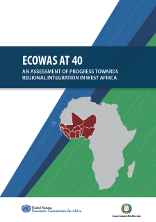ECOWAS at 40 - An assessment of progress towards regional integration in West Africa

This study sought to assess the progress made by ECOWAS toward regional integration. The analysis of the institutional organisation and sectoral policies of ECOWAS has shown that this Community, in general, is a model of advanced integration in the broader context of the African Union, in the same manner as SADC in southern Africa.
In 40 years, ECOWAS has built a solid institutional architectureas a globally recognized organisation. It has strived to adopt protocols and to define policies and programmes covering almost all areas of integration identified in the initial treaty and later in the revised treaty of ECOWAS.
In terms of real impact, the performances of ECOWAS, since its establishment, may be deemed to be largely average at this stage.
ECOWAS has the potential to accelerate the integration of its Member States. It has gained valuable experience in successfully grouping and sustaining countries as members. The challenges of harmonisation have value as well. They provide lessons that the extended regional community could apply for achieving progress in the construction of the unification of its Member States. This is particularly the case of UEMOA. Its membership comprises eight of the 15 ECOWAS countries among which the pooling of interventions or gradual fusion with ECOWAS will enable it to sustain its achievements, while promoting their ownership by ECOWAS.
Today, ECOWAS must take another step toward developing its operational capabilities to generate tangible results for its Member States and Community citizens. In doing so, it can fully meet the targets set in the Constitutive Treaty and celebrate its 50th anniversary, in 2025, by becoming a successful model of Regional Economic Community in Africa.
In that respect, several recommendations have been made in this report.